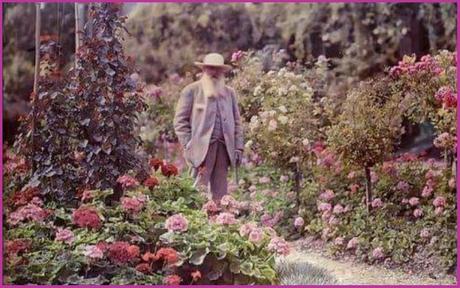
Monet in his garden at Giverny
Claude Monet (1840-1926), rightly celebrated as one of the foremost Impressionist painters, acquired a house with land at Giverny, fifty miles north-west of Paris, when he was in his mid-forties, after his first wife had died. It was to be a stable home for Monet, his children and eventually his second wife. He lived there for the next forty years. As well as renovating the house and building his studio, he also spent decades with the help of family and friends transforming the garden into a botanical paradise in which to live and to paint. He bought more strips of land when he could afford to, and this horticultural project became a lifelong passion.He is quoted as saying: "I am only good at two things, and those are painting and gardening. Everything I have earned has gone into this garden. Colour is my day-long obsession, joy and torment. I perhaps owe having become a painter to flowers. The more I live, the more I realize that the colours at Giverny are the most beautiful colours in the world. My garden is my most beautiful masterpiece."
If you've seen Monet's paintings you're probably familiar with his depictions of agapanthus, geraniums, irises, peonies, roses, water-lilies, willows, wisteria, garden paths, picnics under his trees, brilliant vistas. He painted the same views many times, trying to capture his impressions of the beauty around him. Of course the views were never actually the same, for the colours and light were different on each occasion. Ironically, for all his mastery of his craft, he burned many of his canvasses. Maybe that's how one preserves one's reputation for excellence!
As he grew old, his sight began to fail him, a cruel affliction for one whose life had been all about experiencing and responding to what he saw around him. He still planned enhancements to his garden but now employed a team of gardeners to do the spadework for him. He loved nothing more than to walk around his garden, to share it with friends and visitors, to continue being inspired by its beauty. And he continued to paint under its spell, despite his failing eyesight, even enlarging his studio to accommodate the expansive canvases that he worked on during his final few fading years.
Monet's house and gardens were painstakingly restored after fifty years of neglect and became classified as a 'monument historique' in 1976.Nowadays Giverny is one of the most visited sites in France, outside of Paris.
My own Blackpool back garden is due for a major make-over in the next few months. Out will go rotten old decking and concrete paving slabs. I want more nature, more greenery, flowers, herbs, bees and butterflies, terracotta pots, a tree I'm trying to grow olive saplings from seed but I don't know if the climate is sufficiently conducive - that wintry west wind for instance. Like Monet in his seventies, it will have to be something I can tend to without overmuch back-breaking effort. Design is key, as is the budget. Wish me luck.

geraniums at Kythira in Greece
One thing's for sure, there will be lots of geraniums, as well as irises, lilies and roses. I'll sign off with the latest piece I've been working on. I'm not sure if this is the poem's final flowering or not. Time will tell.Geranium-365Primordial and perennial, in a sun-kissed Kythira garden,from white-washed, rust-streaked tins watered at dusk,Aphrodite's progeny branches and buds, then explodesin profusion, red like blood, pink as passion, incandescent.
She comes once again, apparition more dazzling than flame from a time before earth was formed, hovering between the impossible and the inevitable, a fissile isotope fixingto blow the world apart anew, shatter your flowering heart.
On a simple iron bedstead among twisted sheets we liesavouring consummate peace, with the departing day framedthrough blue shutters. By a trick of inverted light, a flushof geranium red shafts itself across peeling walls and ceiling.
Lucretius, forefather of atomic thought, captured the effectof her florid alchemy thus: "the heavens are all assuaged and pour forth torrents of light; the waves of the sea smile." Coolly you slip out into the dark yard, watering-can in hand.
Thanks for reading, S ;-) Email ThisBlogThis!Share to TwitterShare to Facebook
